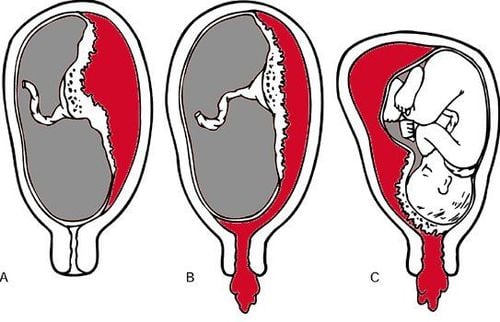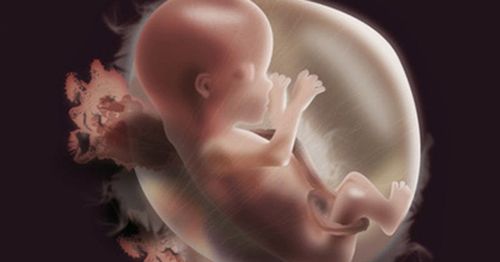This is an automatically translated article.
The article was professionally consulted by Dr. Nguyen Anh Tu - Doctor of Obstetric Ultrasound - Prenatal Diagnosis - Obstetrics Department - Vinmec Hai Phong International General Hospital.According to statistics, about 1% of pregnant women are at risk of facing the problem of excess amniotic fluid. Polyhydramnios usually occurs from the 30th week of pregnancy onwards, however, there are cases of 20 weeks fetus appear polyhydramnios.
1. Overview of polyhydramnios
During the first weeks of pregnancy, amniotic fluid is produced to move fluid from the blood into the amniotic sac. When the fetus is 3 months old, the baby begins to swallow liquids and excretes urine back into the amniotic fluid.
Amniotic fluid plays a very important role for the survival and development of the fetus, creating ideal conditions for the fetus to develop safely during pregnancy.
Normally, the amount of amniotic fluid increases gradually with the week of pregnancy and gradually decreases near the day of labor. So, if you compare your amniotic fluid index (AFI) results with the average amount of amniotic fluid at the corresponding gestational age, you can determine whether the amount of amniotic fluid is more or less than normal.
If the fetus is 16-32 weeks old, the amount of amniotic fluid will be about 300-600ml. A situation where the amniotic fluid is higher than normal is called polyhydramnios (if there is little increase) or polyhydramnios (if there is a large increase). The body of the mother and the fetus will regulate the amount of amniotic fluid continuously, but for the baby to grow and be born healthy, the mother should maintain a normal amount of amniotic fluid and increase it at a stable level.
2. Signs of polyhydramnios
The best way to recognize amniotic fluid problems is to have regular antenatal check-ups. However, in some cases, pregnant women can estimate that they have polyhydramnios if they have the following typical signs:
The pregnant woman's abdomen is larger than her gestational age, it is difficult to hear the fetal heartbeat. Waist circumference (across the navel) is greater than 100cm. A distended abdomen causes pain, feeling short of breath, eating and drinking, having difficulty breathing, or shortness of breath. Leg swelling, varicose veins, back pain. Varicose veins can lead to hemorrhoids during pregnancy.

3. Causes of polyhydramnios during pregnancy
Polyhydramnios at 24-28 weeks can have many causes. Most of them are due to abnormalities in the metabolism between the fetus and its appendages (amniotic fluid, placenta, umbilical cord...); Or it can also be due to genetic problems of the fetus (cleft palate, pyloric stenosis...), due to maternal diabetes mellitus, twins/multiple pregnancy, anemia or fetal infection... Usually pregnant women will have polyhydramnios at 30 weeks onwards, but if you see signs of polyhydramnios at 22 weeks onwards, this is also a sign that pregnant women need to pay special attention to.
4. Is polyhydramnios dangerous?
Normally amniotic fluid is produced by the mother's body and reabsorbed, the fetus also swallows amniotic fluid, so the amount of amniotic fluid will usually change after 24 hours. In fact, a little more amniotic fluid will not affect the fetus and the mother's health. However, if the amniotic fluid is much more than normal (two, three times ..), it is necessary to see a doctor for diagnosis and specific advice.
At a warning level, the phenomenon of polyhydramnios, polyhydramnios can lead to a number of dangerous complications such as premature rupture of membranes causing preterm birth, stretched amniotic sac causing the fetal position to be reversed, and prolonged labor causing Difficulty giving birth, weak uterine contractions make pregnant women prone to postpartum haemorrhage...
5. Method of diagnosis and treatment
For polyhydramnios at 22-28 weeks, the best way is to have regular antenatal check-ups to assess fetal growth and amniotic fluid status at dangerous levels. If you see any unusual symptoms such as a rapidly expanding abdomen, tight skin, fatigue, shortness of breath, etc., then you need to go to a reputable specialist facility to check and fix it in time. Besides, pregnancy Women need to pay more attention to rest because polyhydramnios will make mothers more tired than usual. Besides, pregnant women need to follow a reasonable diet and sleep such as:Eat small amounts regularly Avoid foods and drinks such as fats, coffee, alcohol Ensure the amount of protein and protein in the diet daily diet Eat lots of green vegetables but limit the ones that contain a lot of water. Focus on eating fruits with high fiber and vitamins like apples, pears, bananas, papayas,...and limit succulent fruits like oranges. , grapefruit, watermelon.

Absolutely avoid salty foods because salt has the ability to retain water Do not lie down after meals Do not eat before sleeping Elevate pillows when sleeping Polyhydramnios, if detected and corrected early, will not affect health maternal and fetal health. Therefore, pregnant women need to be active in learning and receiving useful information related to amniotic fluid - the living environment in the mother's womb, in order to prevent and quickly overcome any abnormalities. happen.
Vinmec International General Hospital offers a Package Maternity Care Program for pregnant women right from the first months of pregnancy with a full range of antenatal care visits, periodical 3D and 4D ultrasounds and routine tests to ensure that the mother is healthy and the fetus is developing comprehensively. Pregnant women will be consulted and checked for health under the close supervision of experienced and specialized obstetricians, helping mothers gain more knowledge to protect their health during pregnancy as well as minimize complications affecting mother and child.
Doctor Nguyen Anh Tu has 6 years of experience in obstetrics and gynecology ultrasound, specially researched and trained in pregnancy ultrasound - prenatal diagnosis. Dr. Tu has completed courses on ultrasound - prenatal diagnosis of the FMF International Fetal Medicine Association; trained in consulting and implementing diagnostic intervention techniques in fetal medicine and participated in many specialized conferences and seminars on Fetal Medicine. Currently, he is a doctor at the Department of Obstetrics and Gynecology, Vinmec Hai Phong International General Hospital.
Please dial HOTLINE for more information or register for an appointment HERE. Download MyVinmec app to make appointments faster and to manage your bookings easily.














